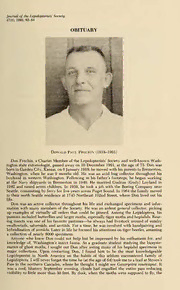
Donald Paul Frechin (1918-1991) PDF
Preview Donald Paul Frechin (1918-1991)
JournaloftheLepidopterists'Society 47(1), 1993, 83-84 OBITUARY ^«PP*!k Donald Paul Frechin (1918-1991) Don Frechin, aCharter Member of the Lepidopterists' Society and well-known Wash- ington state entomologist, passed away on 10 December 1991, at the age of 73. Don was borninGardenCity, Kansas, on6January 1918;hemovedwithhisparentstoBremerton, Washington, when he was 9 months old. He was an avid bug collector throughout his boyhood in western Washington. Following in his father's footsteps, he began working at the Navy shipyards in Bremerton in 1940. He married Gudrun (Gudy) Loyland in 1942 and raised seven children. In 1959, he took a job with the Boeing Company near Seattle, commutingbyferry forfive yearsacrossPuget Sound. In 1964 thefamily moved to their north Seattle residence at 1745 Northeast 102nd Street, where Don lived out his life. Don was an active collector throughout his life and exchanged specimens and infor- mation with many members of the Society. He was an ardent general collector, picking up examples of virtually all orders that could be pinned. Among the Lepidoptera, his passionsincludedbutterfliesandlargermoths—, especially tiger mothsandhepialids. Rear- ing insects was one of his favorite pastimes he always had livestock around of sundry swallowtails, saturniids, and arctiids. For a time, he was involved with handpairing and hybridization of arctiids. Later in life he focused hisattentions on tigerbeetles, amassing a collection of nearly 8000 specimens. Anyone who knew Don could not help but be impressed by his enthusiasm for, and knowledge of, Washington's insect fauna. As a graduate student studying the biosyste- matics of ghost moths, I sought out Don after seeing many of his hepialid specimens in major collections. Upon contacting Don, I found him to be the most knowledgeable Lepidopterist in North America on the habits of this seldom encountered family of Lepidoptera. Iwillneverforgetthetimehe(attheageof64)tookmetoatrailatSteven's Pass in the northern Cascades, where he thought I might see Gazoryctra roseicaput. It was a cool, blustery September evening, clouds had engulfed the entire pass reducing visibility to little more than 30 feet. By dusk, when the moths were supposed to fly, the 84 Journal of the Lepidopterists' Society temperature had dropped to 48°F (=9°C). I was sure no moths would be on the wing in suchweatherandsuggestedtoDonthatourtimewouldbebetterspentatalower, warmer elevation perhaps in a restaurant with beverages on tap. He smiled and countered . . . with a "w—ait and see" look. Sure enough, the moths appeared, when and where Don suggested they disappeared almost as quickly, just thirty minutes later. The size and nature of Don's collection was ever-changing as he often traded or sold partsofit. EugeneMunroe, actingonbehalfoftheCanadian NationalCollection (CNC), purchased most of Don's moths in the late 1950's, including Edward C. Johnston's im- portantcollectionwhichDonrecentlyhadacquired. Inthemid-1980's, IpurchasedDon's synopticcollectionofWashingtonstateMacrolepidoptera; thiscollectionof700specimens is housed at the University of Connecticut. More than 39,000 specimens remain at his home in Seattle; thebulkof these are 22,000Coleoptera and 14,500 Lepidoptera (mostly papered or unspread). AtleasttwospeciesandonegenusofinsectswerenamedafterDon. Munroedescribed the pyralids Pogonogenys frechini and the genus Frechinia. Sanford Leffler described the tiger beetle, Cicindela bellissimafrechini, endemic to the Olympic Peninsula, after him. Don is survived by his wife, six children, and four grandchildren. Part of his legacy will be the countless collections he made of Washington state invertebrates, especially from thebiologically uniqueareasthathesooftenvisited, such asthe RockyPrairienear Tenino, theOlympic Peninsula, andthearctic-alpine areasofthenorthern Cascades. His absence from the Society will be keenly felt. David L. Wagner, Department of Ecology and Evolutionary Biology, U-Box 43, University of Connecticut, Storrs, Connecticut 06269-3043.
